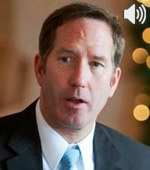ProPublica/IRS Leak: There’s No Underlying “There” There
In our Liberty Update this week, we highlight the latest illegal leak of thousands of supposedly confidential Internal Revenue Service (IRS) taxpayer returns spanning over 15 years, confirming that the partisan and power-hungry IRS simply cannot be trusted to safeguard our sensitive records, let alone to begin collecting sensitive private information from nonprofit organizations on donors who contribute to them in violation of the First Amendment.
Getting to the substance of the ProPublica/IRS leaked documents themselves, former Senator Phil Gramm and U.S. Policy Metrics partner Mike Solon explain in The Wall Street Journal how there’s nothing scandalous in the least in what they reveal:
ProPublica’s ‘blockbuster’ story showing that the wealthy ‘pay income taxes that are only a tiny fraction of the hundreds of millions, if not billions, their fortunes grow each year, looks at first like a stunning revelation. But the whole tempest plops into a teapot once you ask yourself: How much of the total growth in the value of my home, retirement funds and business did I pay federal income taxes on last year? The answer is none. Nobody pays federal wealth taxes in America, but ProPublica and its Democratic allies are using stolen tax returns to try to change that.”
As they correctly conclude, suddenly imposing a nonsensical “wealth tax” would not only be unfair, but destructive:
Proponents of a federal property tax on wealth offer guarantees and protections that they will only tax the superrich like Mr. Buffett, promising not to touch your retirement plan, home, farm or business. But the federal income tax started out only taxing the superrich like John D. Rockefeller. The same politicians who promise to protect you from the federal wealth tax voted to impose income taxes on ‘wealthy’ Social Security retirees with an annual incomes above $25,000. And these are the same politicians who are proposing to tax your businesses and farms at 43.4% when you die, before they take another 40% in death taxes. In taxing wealth we eat the nation’s seed corn. That may be worth it to politicians who want power, but for most Americans a wealth tax, whether they have wealth or not, would mean fewer jobs, lower wages and less opportunity for human flourishing.”
Well said.

 Timothy Lee, CFIF’s Senior Vice President of Legal and Public Affairs, discusses recent attacks by liberal opponents of free speech and CFIF’s victory in the U.S. Court of Appeals for the D.C. Circuit.
Timothy Lee, CFIF’s Senior Vice President of Legal and Public Affairs, discusses recent attacks by liberal opponents of free speech and CFIF’s victory in the U.S. Court of Appeals for the D.C. Circuit. In an interview with CFIF, Mario Lopez, President of the Hispanic Leadership Fund, discusses the concerted, cross-country campaign to force private organizations to hand over to the government their donor lists, a recent federal court ruling in California that vindicates donor privacy and the allegations of suppressed conservative speech by Facebook.
In an interview with CFIF, Mario Lopez, President of the Hispanic Leadership Fund, discusses the concerted, cross-country campaign to force private organizations to hand over to the government their donor lists, a recent federal court ruling in California that vindicates donor privacy and the allegations of suppressed conservative speech by Facebook. In an interview with CFIF, Bradley Smith, Founder of the
In an interview with CFIF, Bradley Smith, Founder of the  In an interview with CFIF, Lori Lowenthal Marcus, Co-founder and President of Z STREET, discusses her organization’s ongoing lawsuit against the IRS, and how an IRS employee informed her that her organization’s tax exempt status application was delayed because the group was “connected with Israel” and expressed opposition to the Obama Administration’s foreign policy.
In an interview with CFIF, Lori Lowenthal Marcus, Co-founder and President of Z STREET, discusses her organization’s ongoing lawsuit against the IRS, and how an IRS employee informed her that her organization’s tax exempt status application was delayed because the group was “connected with Israel” and expressed opposition to the Obama Administration’s foreign policy. In an interview with CFIF, Hans von Spakovsky, Manager of the Election Law Reform Initiative and Judicial Studies at The Heritage Foundation, discusses Lois Lerner’s “lost” e-mails, how the Justice Department is not taking the IRS investigation seriously and other recent IRS scandals.
In an interview with CFIF, Hans von Spakovsky, Manager of the Election Law Reform Initiative and Judicial Studies at The Heritage Foundation, discusses Lois Lerner’s “lost” e-mails, how the Justice Department is not taking the IRS investigation seriously and other recent IRS scandals. In an interview with CFIF, Allen Dickerson, Legal Director at the Center for Competitive Politics, discusses why the California Attorney General’s demand for the list of supporters to a non-profit organization damages freedom of association, violates the clear terms of a federal tax law and ignores the Supremacy Clause of the United States Constitution.
In an interview with CFIF, Allen Dickerson, Legal Director at the Center for Competitive Politics, discusses why the California Attorney General’s demand for the list of supporters to a non-profit organization damages freedom of association, violates the clear terms of a federal tax law and ignores the Supremacy Clause of the United States Constitution. In an interview with CFIF, Peter Roff, contributing editor at U.S. News & World Report, discusses the Obama Administration’s use of the IRS to silence its critics by limiting the First Amendment rights of tax exempt groups.
In an interview with CFIF, Peter Roff, contributing editor at U.S. News & World Report, discusses the Obama Administration’s use of the IRS to silence its critics by limiting the First Amendment rights of tax exempt groups. CFIF Freedom Line Blog RSS Feed
CFIF Freedom Line Blog RSS Feed CFIF on Twitter
CFIF on Twitter CFIF on YouTube
CFIF on YouTube